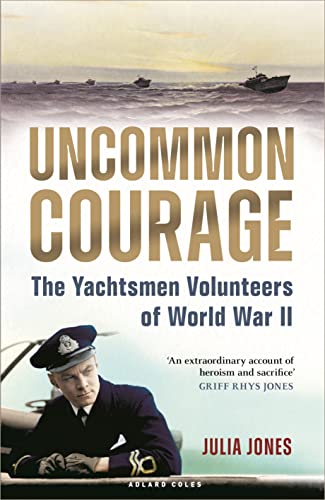
“对英雄主义和牺牲精神的非凡描述。一个意想不到的重要故事,引人入胜地讲述。撕扯咆哮的东西。把这个放进你生命中的海狗的爪子里。”格里夫·里斯·琼斯
“岸上的人们没有意识到我们在海上与德国人展开了多么残酷的战争。这是一场冷血的战争,从某种程度上说,我认为,从长远来看,这需要双方的人都表现出最大的勇气,因为这是一场无休无止、无形的战争。你只是不知道下一刻是否是你的最后一刻罗伯特·希金斯,RNVSR
几年前,茱莉亚·琼斯(Julia Jones)在家中搜寻被遗忘已久的物品,发现了一些装有旧书写材料的行李箱,这些材料原来是她父亲讲述的他在皇家海军志愿者补充后备队(RNVSR)的经历。她意识到,当她还是个孩子的时候,她遇到了一些提到的人,虽然她还太小,无法真正了解他们,但这些年轻的印象促使她重新发现和理解。
在这本引人入胜的书中,朱莉娅讲述了游艇驾驶员令人信服的故事。有些人很有名(如彼得·斯科特爵士),有些人很富有(如奥古斯特·考托尔德,他返还工资帮助战争),但大多数人都是“普通”专业人士,如出版商、律师和广告代理商,他们签约是因为他们热爱航海。很少有人会想到,他们最终会在远远超出正常生活的地区行动,因为他们发现自己指挥着驱逐舰和潜艇,并执行秘密破坏任务。有些人每天都要从事危险的扫雷工作;其他人则处理未爆炸的炸弹,与敌人进行高速攻击,或在伊恩·弗莱明著名的情报突击队中扮演关键角色。
这些形形色色的船员被赋予了对战争至关重要的任务,需要耐力、非凡的勇气、足智多谋和敏捷的思维。一些人在这个过程中死亡,但对于那些幸存下来的人,朱莉娅问他们的经历如何改变了他们。他们对航海和海洋的热爱能在残酷的战争现实中生存下来吗?
Uncommon Courage: The Yachtsmen Volunteers of World War II
‘An extraordinary account of heroism and sacrifice. An unexpected and important story, rivetingly told. Rip roaring stuff. Get this into the paws of the sea dog in your life.’ Griff Rhys Jones
‘People ashore don’t realise what a grim war we are waging at sea with the Germans. A cold-blooded war, in a way I think requiring the maximum of bravery from the men of both sides in the long run, as it is so ceaseless and intangible. You just don’t know whether the next moment will be your last.’ Robert Hichens, RNVSR
Several years ago, Julia Jones was searching through long-forgotten items stored at her house and discovered some suitcases of old written material, which turned out to be accounts by her father of his experiences in the RNVSR (Royal Naval Volunteer Supplementary Reserve). She realised that as a child she’d met some of the people mentioned, and although she was too young to truly know them, these youthful impressions spurred her on to rediscovery and understanding.
In this absorbing book Julia tells the compelling stories of the yachtsmen. Some were famous (such as Sir Peter Scott), others were wealthy (such as August Courtauld, who returned his pay to help with the war effort) but the majority were just ‘ordinary’ professionals such as publishers, lawyers and advertising agents, who signed up because they loved sailing. Few could ever have dreamed that they would end up acting in areas that were so far beyond their normal lives, as they found themselves commanding destroyers and submarines, and undertaking covert missions of sabotage. Some undertook the dangerous daily drudgery of minesweeping; others tackled unexploded bombs, engaged the enemy in high-speed attacks or played key roles in Ian Fleming’s famous intelligence commandos.
This varied crew of men were given tasks vital to the war effort, requiring endurance, extraordinary bravery, resourcefulness and quick thinking. Some died in the process, but for the ones who survived, Julia asks how their experiences changed them. Could their love of sailing and the sea survive the harsh realities of war?
OR

![看起来像敌人:我在日美拘留营中被监禁的故事[有声读物]](https://www.yousuxue.com/wp-content/themes/riplus/timthumb.php?src=https://sanet.pics/storage-8/0422/GpbUdw4c5JbToWX8IvDSvPjsRYY41uBw.jpg&h=200&w=300&zc=1&a=c&q=100&s=1)


